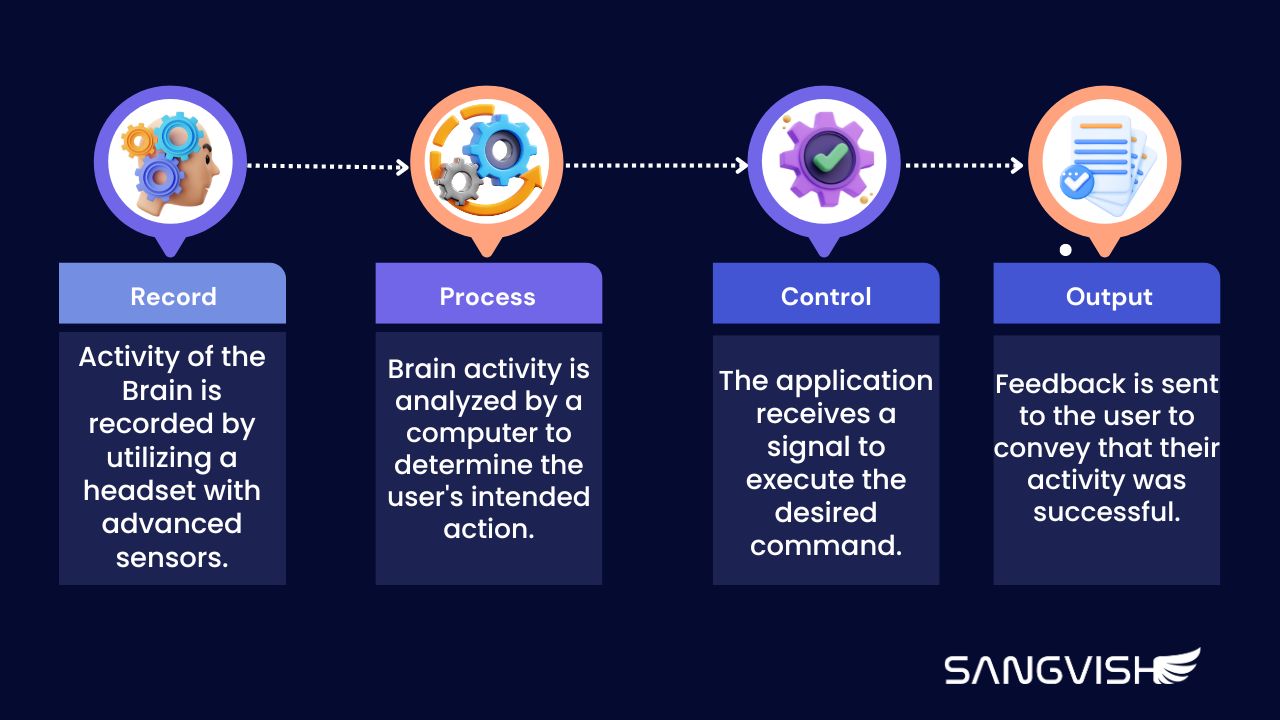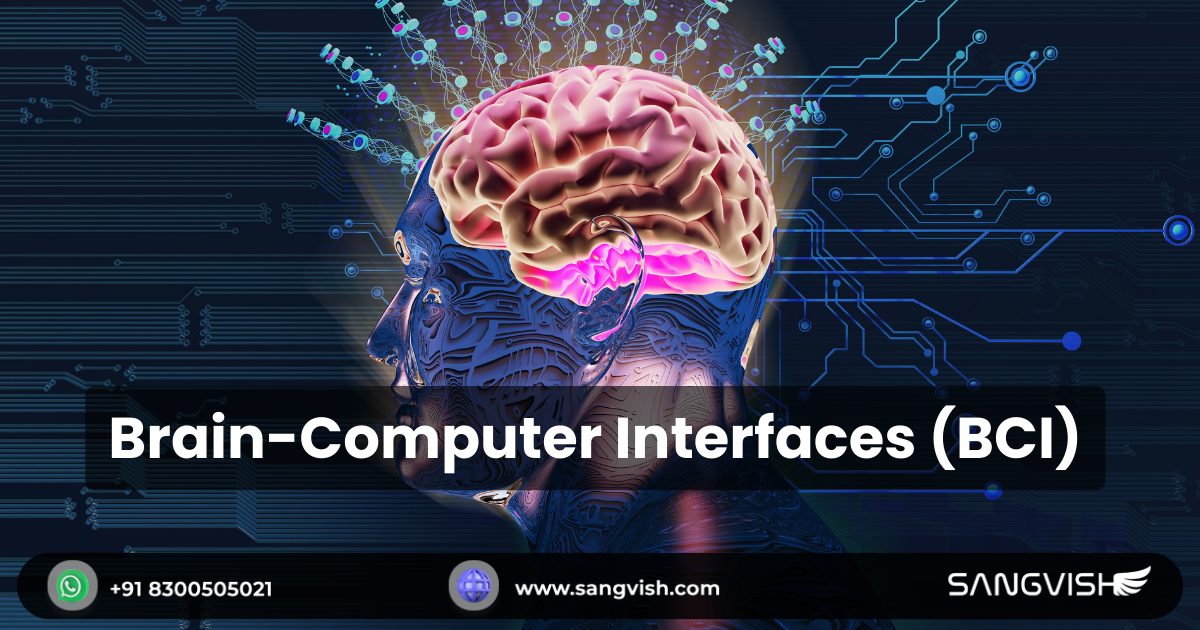Have you ever imagined handling a computer with your thoughts? The world of science fiction has become a reality with the growth of brain-computer interfaces (BCIs). These amazing technologies can potentially change how we engage with technology, opening up new avenues for communication, rehabilitation, and even entertainment. In this blog, we’ll delve into the exciting world of BCIs, examining what is BCI, how they work, and their advantages & disadvantages.
What is the Brain-Computer Interface?
A Brain-Computer Interface (BCI), also known as a Brain-Machine Interface (BMI), is a technology that allows simple communication between the brain and a device that is outside the body, such as a computer or an artificial limb, without relying on the body’s normal peripheral nerves and muscles. BCIs may read brain signals like neural activity patterns or electrical impulses and use them to control gadgets, transmit thoughts, or even stimulate particular brain areas.

How it Works?
A brain computer interface (BCI) is a device that uses your brain activity to directly infer your functional intent—the desire to move, control, alter, or interact with anything in your surroundings. BCIs, in other terms, let you use only your thoughts to operate a program or a gadget.
Whenever we want to control or communicate with a device in our surroundings (for example, a lamp), we usually determine what we would like to do (turn on the light), then collaborate and utilize the muscles in our arms, legs, hands, feet, and so on to carry out that task (reaching through your finger and tap the lamp’s on/off switch). Lastly, the device reacts to that action (the light turns on). Brain-machine interfaces (BCIs) avoid the intermediate step of coordinating and using your muscles to perform the desired action by employing a computer to recognize the intended action and immediately operate the application or device. This is the reason why BCIs are being examined as a promising access technology for individuals with serious impairments who have limited trustworthy control over their musculature and bodies.
Advantages Of BCI(Brain Computer Interface)
1. Assistive Technology
BCIs bring enormous benefits to people with impairments. They can assist people with immobility or severe neurological disorders in handling computers, wheelchairs, or robotic limbs, improving their mobility and standard of life.
2. Communication Enhancement
For people who are incapable of speaking or typing, BCIs provide an alternative way of communication. By analyzing brain signals, these technologies may assist communication via text or speech synthesis, giving a voice to people who otherwise may stay silent.
3. Neurorehabilitation
BCIs are utilized to help individuals recovering from strokes or severe brain injuries. By giving patients exercises that stimulate the plasticity of the brain, which improves motor function and aids in cognitive recovery, they can encourage neural healing.
4. Gaming and Entertainment
The gaming industry is looking into BCIs for fully integrated experiences, which allow players to handle games with their minds. This not only improves gaming but also opens the path for new forms of interactive entertainment.
5. Mental Health Apps
BCIs can help to monitor and manage mental health issues. They have the potential for use in neurofeedback treatment, which teaches people how to control brain activity linked with stress, anxiety, or depression, resulting in enhanced mental health.
6. Research and Understanding
BCIs allow researchers to examine brain activities in real-time. This improves our understanding of brain processes and has the potential to progress cognitive neuroscience by providing insights into memory, perception, and consciousness.
7. Adaptive Learning and Training
In educational contexts, BCIs can personalize learning experiences to the user’s mental state. This customized strategy can improve learning outcomes and engagement by altering content or difficulty according to real-time brain activity data.
Disadvantages Of BCI(Brain Computer Interface)
1. Invasiveness and Health Risks
Many BCIs, particularly those with great accuracy, are intrusive. They need surgical operations to implant electrodes in the brain, which can result in serious health complications such as infections, bleeding, and long-term tissue damage. Even non-invasive BCIs may cause discomfort or irritation over time.
2. Ethical and Privacy Concerns
BCIs bring ethical concerns around consent, autonomy, and privacy. The capacity to access or interpret brain impulses may lead to the misuse or unwanted monitoring of thoughts, providing serious privacy concerns. Ensuring the security and ethical usage of BCI data is a major challenge.
3. Technical Limitations
BCIs are still in development, and many systems meet technical challenges such as poor signal resolution, limited accuracy, and long response times. These restrictions can have an impact on the use and effectiveness of BCIs, particularly in complicated tasks.
4. Cost and Accessibility
The cost of developing and implementing BCI technology might be too expensive for many individuals and institutions. High expenses may restrict the widespread adoption and utilization of BCIs, especially in people with lower incomes environments.
5. Psychological impact
Utilizing BCIs can result in psychological effects, such as dependency or changes in self-perception. Users may feel stressed or anxious about device performance or data interpretation, which might have an impact on their mental health.
6. Technical and user challenges
Each person produces distinct brain signals that are challenging to measure precisely. Furthermore, learning how to utilize a BCI might necessitate extensive training.
7. Security and privacy
BCIs may be vulnerable to hackers that disclose brain data or interrupt device performance.
Conclusion:
Brain-computer interfaces have enormous and transformational potential. As technology advances, BCIs are anticipated to play an increasingly important role in a variety of fields, increasing quality of life, encouraging communication, and opening up new possibilities for research and interaction. The future of BCIs promises both practical uses and significant insights into the functioning of the human brain.



